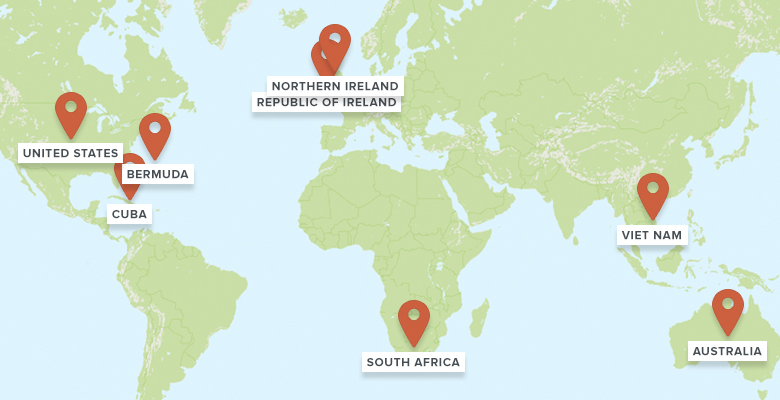Why Did You Invest in the Regions That You Did?
Our founder, Chuck Feeney, had close connections to the regions where Atlantic made its major investments. In each, he and Atlantic saw opportunity to make a lasting difference within his lifetime.

Australia’s rugged terrain and its people’s can-do attitude had great appeal to Feeney. He saw undervalued institutions with creative leaders who deserved more opportunity. For Feeney it was value investing, with a big upside that led to substantial investments over 15 years for higher education, health care and research.
Bermuda was Feeney’s choice for his foundation’s home, largely because it offered the opportunity to continue to operate subsidiary businesses and maximize the endowment, while also pursuing philanthropy anonymously. The foundation made grants that benefited Bermudians, by focusing on strengthening philanthropy and local nongovernment organizations, and advancing social change on the island.
Cuba appealed to Feeney as an exemplar of how a nation builds a high-quality health care system with limited resources. Atlantic also saw an opportunity to use Cuba’s expertise to influence health outcomes globally.
Northern Ireland’s political violence, known as the “Troubles,” pained Feeney, an Irish American. Feeling the pull from his ancestral ties to Northern Ireland, he became personally involved during the 1980s to help end the conflict. Atlantic’s later grants focused on peace-building and creating a more equitable and cohesive society.
The Republic of Ireland‘s initial attraction to Feeney was the chance to revitalize higher education. Atlantic’s later investments in research institutions—made in partnership with government—helped kickstart a knowledge economy. Atlantic also helped transform the delivery of services for disadvantaged children and older adults, and protected and advanced human rights for those marginalized in Irish society.
As South Africa began emerging from the oppression of apartheid, Atlantic saw the opportunity to help with the transition to a constitutional democracy and to extend rights and services, especially in education and health, to millions who had historically been denied them. Feeney personally saw the opportunity to boost health services and research at historically disadvantaged higher education institutions.
In the United States, the opportunity to go to college on the GI Bill taught Feeney the value of a helping hand and the good it returns. That same ethos of helping those less fortunate has been reflected in Atlantic’s U.S. work and around the world: to promote opportunity, fairness and equity, particularly for those systematically denied them.
Viet Nam’s struggles to rebuild after the war motivated Feeney to help. Atlantic invested in universities—including making grants to turn libraries into cutting-edge educational hubs, and in strengthening Viet Nam’s health systems, particularly in rural and underserved regions.
Although different opportunities brought Chuck Feeney and Atlantic to each region, the learning from grants made in one location influenced, supported and enhanced programs in others. All these investments also shared a perceived opportunity to achieve lasting system improvements in health, education and human rights.